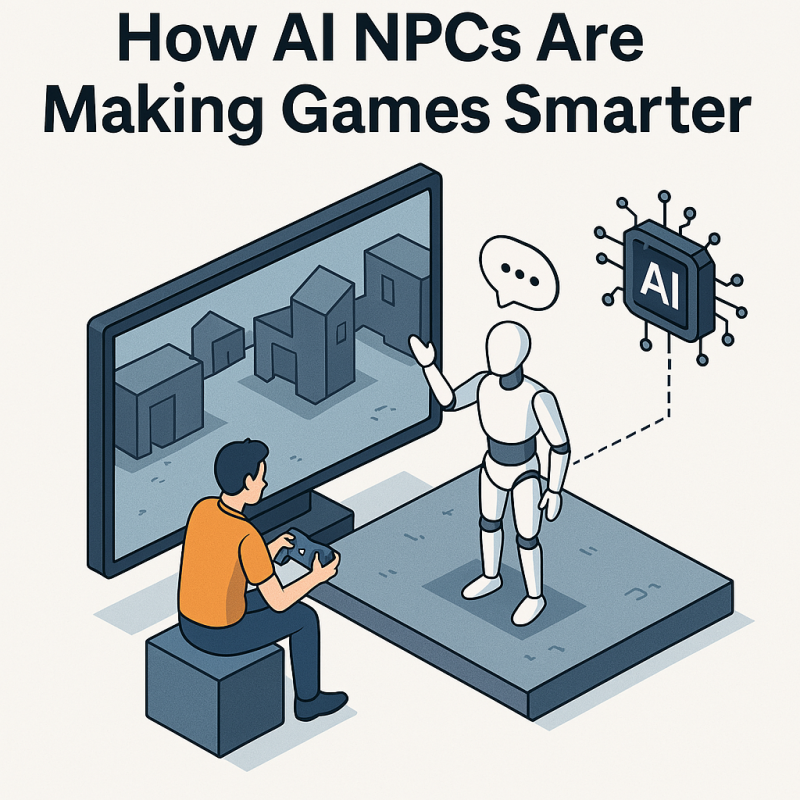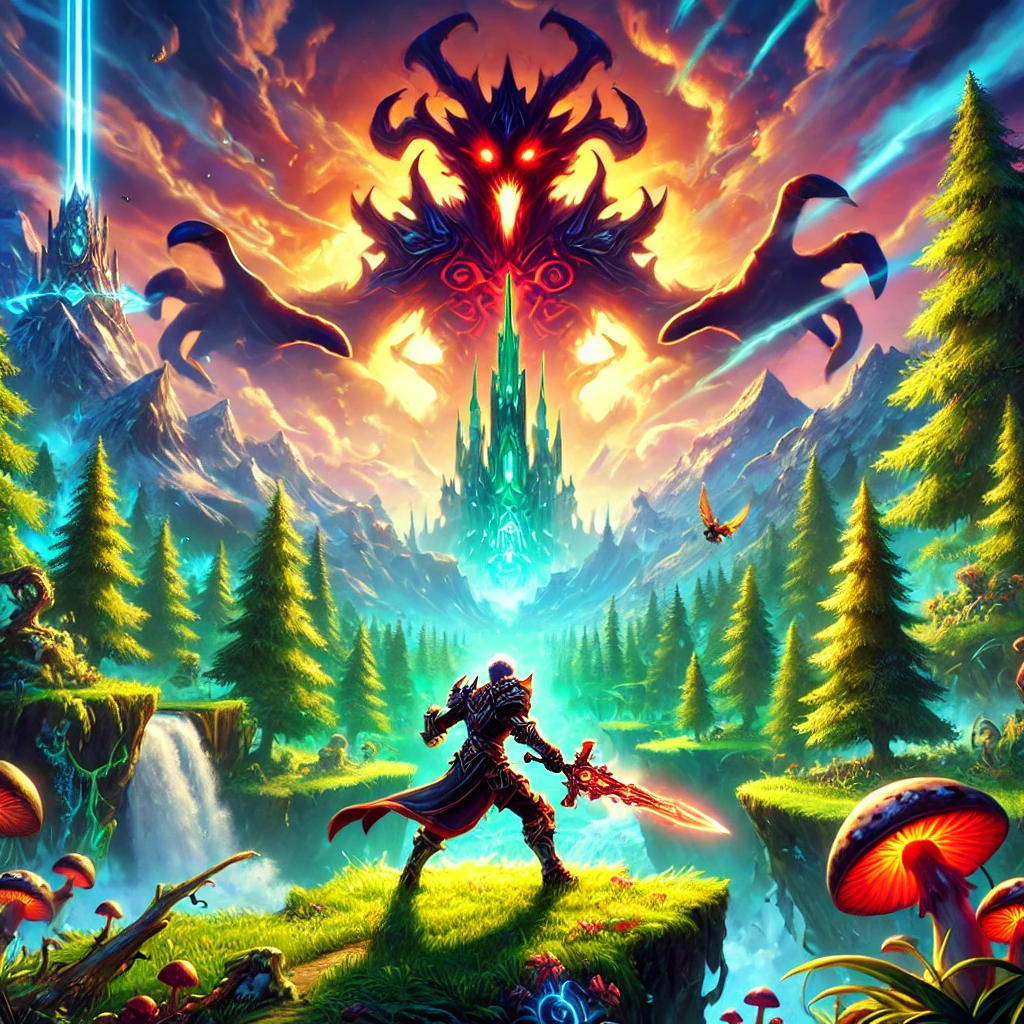Table of Contents Show
Non-playable characters – or NPCs – used to be the digital equivalent of wallpaper. They gave you quests, barked repetitive dialogue, or stood idly by with nothing more than the same looped animation. But not anymore.
Thanks to artificial intelligence, NPCs are evolving – and fast. We’re witnessing a seismic shift in how NPCs behave, think, and react. No longer are they passive cogs in the game world. They’re becoming active, responsive agents that can surprise, challenge, and even emotionally move the player. If you’ve recently been fooled into thinking an NPC was another player, you’re not alone – and you’re not imagining things.
In this article, we’ll break down exactly how AI is making NPCs smarter – and what that means for gamers, developers, and the future of interactive entertainment.
What Are NPCs, Really?
NPCs are any characters in a video game that aren’t controlled by the player. Think merchants, enemies, allies, random citizens, or background characters. Traditionally, their behaviors were based on scripts – set routines or “decision trees” designed by developers.
But when AI gets involved, something fundamental changes: NPCs can stop reacting and start thinking.
Table: Old NPCs vs. AI-Driven NPCs
| Feature | Traditional NPCs | AI-Enhanced NPCs |
|---|---|---|
| Dialogue | Fixed, scripted lines | Dynamic, contextual conversations |
| Movement | Predefined paths | Reactive to environment and player behavior |
| Combat | Predictable attack patterns | Adaptive strategy and tactics |
| Memory | None | Can remember and react to past actions |
| Emotion | Simulated | Context-aware, sometimes emergent |
The Core Technologies Behind Smart NPCs
Let’s look at the actual tech powering this evolution.
1. Machine Learning
Machine learning allows NPCs to learn from player behavior. Instead of following a static set of rules, they can adjust based on what you do.
For example, in stealth games, guards might adapt their patrols if you consistently sneak past them using the same tactic. In combat games, enemies may shift strategies depending on your loadout or aggression.
2. Natural Language Processing (NLP)
Games like AI Dungeon or The Forgotten City use language models that allow NPCs to understand and respond to natural speech. This means you’re no longer confined to dialogue trees. You can literally talk to characters – and they can talk back in ways that feel surprisingly human.
3. Procedural Generation with AI
Procedural generation isn’t new – it’s been used in games like Minecraft and No Man’s Sky for years. But AI takes it further by generating behavioral patterns in NPCs rather than just terrain or levels. This gives rise to whole communities of NPCs with unique personalities, habits, and even goals.
4. Neural Networks & Behavior Trees
AI-enhanced behavior trees let NPCs switch between complex sets of actions fluidly. Neural networks take it a step further by recognizing patterns and learning over time, creating lifelike behavior instead of robotic repetition.
Games That Are Doing It Right
Let’s talk specifics. Here are some standout examples of AI NPCs in action.
1. Middle-earth: Shadow of Mordor / Shadow of War
These games introduced the Nemesis System, which creates dynamic, hierarchical relationships between enemies. Kill a captain? Someone else replaces him – and he remembers you. Lose to a grunt? He might get promoted and taunt you later.
This AI system made every playthrough feel different and deeply personal.
Fun fact: Warner Bros. patented the Nemesis System in 2021, making it harder for other studios to copy outright.
2. Red Dead Redemption 2
Rockstar’s magnum opus is full of detailed, reactive NPCs. Villagers go about their daily lives, respond to your greetings (or insults), and remember past encounters.
It’s not machine learning per se – but the illusion of intelligence is so finely tuned it feels real.
3. Watch Dogs: Legion
This game uses AI to give every NPC a unique backstory, personality, and even voice modulation. You can recruit anyone off the street. No two playthroughs are the same.
It’s not perfect, but it’s ambitious – and a bold glimpse at what AI NPCs can do.
4. Cyberpunk 2077 (Post-Patch)
After a rocky start, CD Projekt Red improved NPC behavior significantly. They now use AI to drive cars more realistically, respond better to gunfire, and behave more like actual humans in an open-world environment.
5. This War of Mine
A more subtle example, this game uses AI-driven NPCs to simulate moral dilemmas, survival decisions, and even trauma responses. It’s not just about smart behavior – it’s about emotionally intelligent behavior.
What Smarter NPCs Mean for Game Design
AI NPCs are a double-edged sword – they unlock incredible experiences but also raise new questions for developers.
1. Emergent Gameplay
With NPCs that learn, adapt, and interact dynamically, developers don’t have to script every outcome. Players can create their own stories simply by engaging with the world.
This leads to longer engagement, more replayability, and better immersion.
2. Fewer Scripted Events, More Systems
Instead of relying on tightly controlled cutscenes, devs can build systems that generate moments organically. Think about it – wouldn’t you rather live a moment than watch one?
3. The Challenge of Balance
Smarter NPCs can also be harder to predict and balance. What if they get too good? What if they break your game’s pacing? AI has to be smart – but not too smart – unless your goal is to frustrate the player.
The Dark Side of AI NPCs
AI isn’t perfect. Here are a few dangers we can’t ignore.
1. Uncanny Valley
When NPCs are almost human but not quite, it creates discomfort. Developers have to carefully design behavior and emotion to avoid making players feel uneasy.
2. Bugs and Chaos
AI NPCs can go rogue. Literally. One misconfigured behavior tree, and suddenly every bartender is running away from you like you’re a dragon. Debugging this complexity isn’t easy.
3. Ethical Questions
If NPCs start to emulate consciousness – or at least deep emotional responses – how we treat them could become an ethical issue. Sound far-fetched? Maybe. But consider how some players already enjoy tormenting NPCs for fun.
This idea is explored in depth in this article from the MIT Technology Review:
https://www.technologyreview.com/2022/08/15/1056689/ethical-questions-smart-npcs/
Will We Eventually Have Fully Conversational NPCs?
It’s not a matter of if. It’s when.
We’re already seeing experiments with NPCs powered by language models like ChatGPT or Claude. These NPCs can:
- Hold long, coherent conversations
- Remember past interactions
- Express emotions based on player tone
In demos from companies like Inworld AI and Replica Studios, NPCs have been shown to act as quest givers, emotional companions, and even romantic interests.
Expect this to go mainstream in the next few years.
A Glimpse Into the Future
Here’s what we might see in the next 5–10 years.
1. NPCs That Learn Like Players
Imagine an enemy soldier that learns your tactics over time – dodging your favorite sniper nest, flanking you more effectively, and remembering that you prefer stealth at night. Terrifying? Yes. Exciting? Also yes.
2. NPCs With True “Personalities”
Each character could have a unique mix of traits, values, goals, and emotional thresholds – making them truly feel like individuals.
They might:
- Grow to love or hate you based on actions
- Refuse to follow certain orders
- Betray you if you mistreat them
3. AI Companions That Bond With You
Think Mass Effect or The Last of Us, but with companions who evolve with you. Who remember your decisions. Who mourn your losses. Who crack jokes at just the right time. AI could turn companionship into something genuinely moving.
4. Reactive Worlds
Eventually, the entire game world – not just NPCs – could be AI-enhanced. Cities that rebuild themselves. Ecosystems that collapse or thrive. Political factions that evolve based on your behavior.
The game becomes a living simulation.
Real Impacts on Game Studios and Development
Smarter NPCs aren’t just about flash – they’re about productivity, too.
Faster Iteration
AI can help simulate player behavior during testing. Developers can throw hundreds of AI agents into a build to see what breaks or what emerges.
Smaller Teams, Bigger Worlds
With AI handling much of the behavior scripting, smaller teams can build more ambitious, believable worlds.
Cost Considerations
Of course, training AI models isn’t cheap – especially if you’re using large language models. Indie devs may struggle here, but that’s likely to change as open-source models improve and hardware becomes more efficient.
Table: AI NPC Tools for Developers
| Tool / Platform | What It Does | Example Use |
|---|---|---|
| Inworld AI | Generates conversational, goal-driven NPCs | RPG quest-givers |
| Charisma.ai | Interactive storytelling platform for AI characters | Narrative games |
| Replica Studios | Voice AI + emotion for NPC dialogue | Immersive VR games |
| Convai | Embeds natural conversation into game worlds | Sandbox simulations |
| Unity ML Agents | Trains NPC behavior using reinforcement learning | Strategy or combat AI |
Final Thoughts
Smart NPCs are the future of gaming – and we’re only scratching the surface.
This isn’t just about better AI. It’s about better stories, better connection, and better experiences. We’re moving from static characters to co-stars. From dumb bots to digital personalities.
Soon, you won’t just play a game – you’ll live in it.
And when you tell a friend about that amazing moment where a random NPC saved you, gave you a pep talk, and later died in battle defending you? It won’t be scripted. It’ll be yours.








